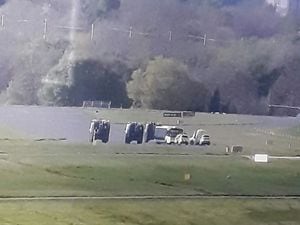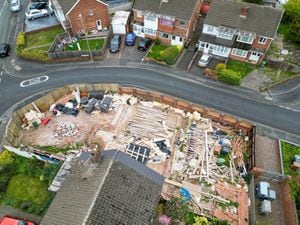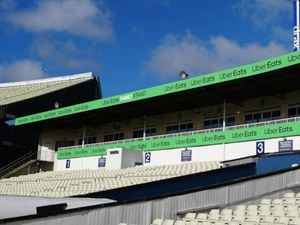West Midlands Police see five fold increase in initial terrorism investigations
It's one of the biggest pressures facing police today - and it has emerged officers are five times busier battling the terrorism threat to the West Midlands than last year.
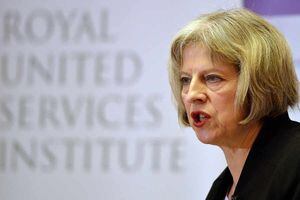
The news comes as a Government clamp down sees schools, prisons and councils set to be legally bound to put in place measures to stop would-be extremists from being drawn into terrorism. Greater checks to stop the internet being used as a recruiting agent by Jihadists are also on the way along with powers to forcibly move terror suspects around the country.
Home Secretary Theresa May said when announcing the package of changes in the new Counter-Terrorism and Security Bill set to be introduced to Parliament today: "We are engaged in a struggle that is fought on many fronts and in many forms. It will go on for many years and the threat we face right now is perhaps greater than it ever has been. We must have the powers we need to defend ourselves."
Detective Chief Superintendent Sue Southern, head of the West Midland Counter Terrorism Unit that also covers Staffordshire said: "There has been a five fold increase in our initial investigations over the past 12 months and 50 per cent of those under suspicion were not initially on our radar which makes it far more difficult to understand the issues."#
She added that Birmingham faced the largest terrorist threat outside London but stressed: "People should be alert but not alarmed."
Her warning came amid a week long nationwide drive to highlight the dangers facing this country after the terror threat level was raised to severe.
Chief Superintendent Southern declined to discuss exact numbers of those currently believed to be posing a threat in the West Midlands but conceded: "It is worrying and puts into perspective the significant threat that stems from the conflict in Syria. There is a massive threat of people being radicalised."
The Home Secretary has revealed that 40 terror plots have been foiled by police and intelligence service since the London July 7 attacks in 2005.
Since April 2010, 753 people have been arrested for terrorism-related offences, 212 have been charged and 148 have been successfully prosecuted in this country.
A total of 138 people are behind bars serving sentences for terrorism-related offences, Mrs May added, while 13 people, including hook-handed radical cleric Abu Hamza, have been extradited.
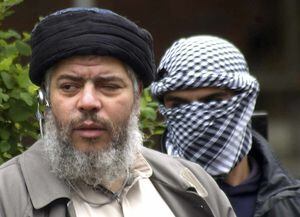
The national CounterTerrorism Internet Referral Unit has removed 65,000 items from the internet that "encouraged or glorified acts of terrorism" with content relating to Islamic State (IS), Syria and Iraq representing around 70% of its current caseload.
Mrs May revealed she has now excluded 61 people from the UK on national security grounds and 72 people because their presence here would not have been 'conducive to the public good.' In total, she has excluded 84 'hate preachers.'
The Home Secretary disclosed that since May 2010, the British citizenship of 27 people has been revoked, mostly for terrorist activities, while 29 passports have been refused or cancelled to disrupt the travel of people planning to engage in terrorist-related activity overseas since April last year.
The Home Office officially admits that around 500 people from Britain have gone to join rebel groups fighting in Syria and Iraq but some experts suggest it could be closer to 2,000.
The police have admitted that they need help from the public to cope with a challenge that Scotland Yard's Assistant Commissioner Mark Rowley - the nation's senior could face the country for years.
Up and down the country this week, officers will be briefing more than 6,000 people at 80 venues including schools, universities, airports, shopping centres, cinemas and farms in a bid to engage individuals and businesses in preventing attacks.
West Midland Counter Terrorism Unit officers held meetings with retailers in Birmingham, Wolverhampton, Coventry, Solihull and Stratford yesterday (Monday). They also met with staff at New Cross Hospital. These were all part of regular discussions that take place at up to ten times a week at meetings with various sectors of the community ranging from schools through mosques to airports, banks and gun clubs.
The rise in terror-related investigations in the region cover attack planning, fundraising, the transport of people, money and equipment to support rebel groups overseas and the radicalisation of individuals.
Police are warning of bogus street collections, raising cash to fund terrorism - £15,000 was collected in this way during an earlier West Midlands plot that saw eleven men from Birmingham jailed at Woolwich Crown Court last year at end of one of the largest ever counter-terrorism operations in the UK that uncovered a cell of would-be suicide bombers who were trying to recruit others to their cause.
Police will tomorrow turn the spotlight on tell tale signs of people – especially the young – being radicalised in the hope that families will tip-off officers before those involved leave the country to fight for rebel groups and learn bomb making and other skills that could be brought back to these shores on their return. There have been 77 reports of this kind from people throughout the country this year, some of which have led to the detection of would-be terrorists.
West Midland and Staffordshire gun clubs and dealers are being urged to keep a lookout for new members and customers acting suspiciously while farmers and others dealing with chemicals like fertilizers that can be used to make improvised explosive devices are being urged to store them securely.
All week at railway stations across England, Scotland and Wales, BTP officers will be providing counter-terrorism information to passengers and delivering training sessions to rail staff.
Police are also set to be given the power to force internet firms to hand over details that could help identify suspected terrorists and paedophiles. The Counter-Terrorism Bill will oblige internet service providers (ISPs) to retain information linking Internet Protocol (IP) addresses to individual users.
Labour leader Ed Miliband said they wanted to work with the Government over the issue but critics such as Shami Chakrabarti, director of human rights group Liberty, have savaged the crack down. She dubbed it a 'chilling recipe for injustice and resentment by closing down the open society you seek to promote.'
The Home Secretary retorted: "This legislation is important. The substance is right. The time is right. And the way in which it has been developed is right.
"It is not a knee-jerk response to a sudden perceived threat. It is a properly-considered, thought-through set of proposals that will help to keep us safe at a time of very significant danger."
Jonathan Cheetham, Chairman of Birmingham Retail, has over 1,000 members in the city, said: "We work closely with the police because we have 40,000 pairs of eyes and ears from our staff who can keep watch for suspicious activity. It is a huge resource that must be utilised.
"I do not think these warnings will hit footfall in the shops during the run up to Christmas. Terrorists want to create maximum impact with their attack and so it would be wrong not to discuss this at a time when more people than usual are likely to be in places like Birmingham. It is just a matter of keeping things in perspective."

